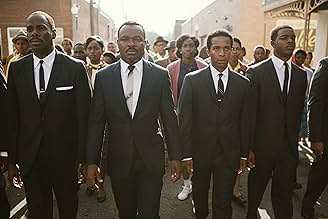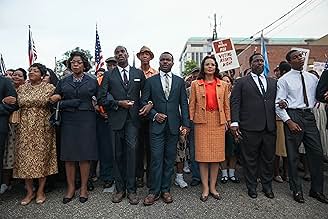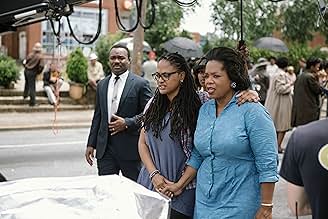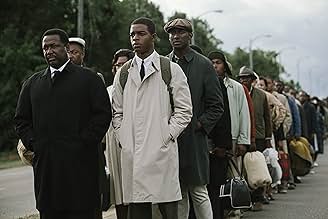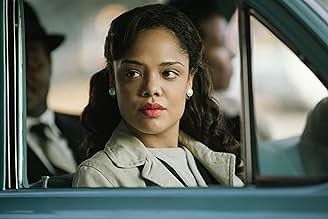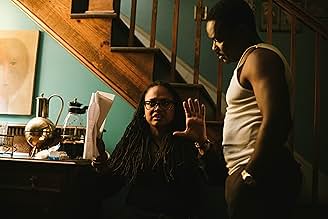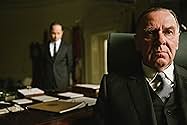Uma crônica da campanha do Dr. Martin Luther King Jr. para adquirir o direito de voto durante a marcha desde Selma até Montgomery em Alabama, em 1965.Uma crônica da campanha do Dr. Martin Luther King Jr. para adquirir o direito de voto durante a marcha desde Selma até Montgomery em Alabama, em 1965.Uma crônica da campanha do Dr. Martin Luther King Jr. para adquirir o direito de voto durante a marcha desde Selma até Montgomery em Alabama, em 1965.
- Direção
- Roteirista
- Artistas
- Ganhou 1 Oscar
- 58 vitórias e 91 indicações no total
- Girl #5
- (as Nadej Bailey)
- James Orange
- (as Omar Dorsey)
Enredo
Você sabia?
- CuriosidadesThe explosion in the opening scene is the infamous 16th Street Baptist Church bombing, which occurred in Birmingham, Alabama on September 15, 1963. The 4 young girls killed in the bombing were Addie Mae Collins, Denise McNair, Carole Robertson, and Cynthia Wesley.
- Erros de gravaçãoWhen MLK meets with LBJ in the Oval Office, Johnson is seated at the Resolute Desk. When Lyndon B. Johnson took office in 1963, he found he was too large for the desk, and commissioned a plainer replacement which was built by the Senate cabinet shop.
- Citações
Martin Luther King Jr.: [somberly yet passionately speaking to church congregation at a funeral] Who murdered Jimmie Lee Jackson? Every white lawman who abuses the law to terrorize. Every white politician who feeds on prejudice and hatred. Every white preacher who preaches the Bible and stays silent before his white congregation. Who murdered Jimmie Lee Jackson? Every Negro man and woman who stands by without joining this fight as their brothers and sisters are brutalized, humiliated, and ripped from this Earth.
- Cenas durante ou pós-créditosMartin Sheen is not listed in the credits.
- Trilhas sonorasOne Morning Soon
Written by Traditional
Performed by Joyce Collins & Johnita Collins
Courtesy of Tompkins Square, LLC
March 7, 1965 is known as Bloody Sunday and marks one of the most despicable moments in U.S. history. It was also a turning point in the Civil Rights Movement and can be viewed as shrewd strategy from Martin Luther King, Jr. and his organization, the Southern Christian Leadership Conference. The movie makes it clear that MLK had a full understanding that Selma, Alabama and it's racist, redneck Sheriff Jim Clark provided the perfect opportunity for a violent reaction to King's demonstrations and protests. It also makes it very clear that there was boundless ignorance, hatred and racism on the part of many southern whites. If the subject matter is somehow not enough to grab your attention, the startling event that occurs 5 minutes in will surely leave you shaken.
The film does an outstanding job of focusing on two pieces of this most complex puzzle: 1. the boots on the ground – the grass roots movement of the people, and 2. the ongoing political debates occurring between MLK and LBJ, between LBJ and his staff, and between MLK and his lieutenants.
The Civil Rights Act had already been passed, so the efforts were in hopes of overcoming the obstacles faced by southern blacks who wished to vote. One of the film's best scenes has activist Annie Lee Cooper (Oprah Winfrey) trying yet again to have her voter registration processed, but being rebuffed by a county clerk through an impossible Q&A session. These intimate moments are where the film excels: Coretta questioning MLK on his love for her, MLK speaking with grandfather of Jimmie Lee Jackson outside the morgue, and MLK turning down the proposal of US Attorney John Doar (Alessandro Nivola).
In an odd twist of casting, four of the leading characters are played by Brits: David Oyelowo as MLK, Tom Wilkinson as LBJ, Tim Roth as George Wallace and Carmen Ejogo as Coretta Scott King. All four are excellent, but it's Mr. Roth as the racist-beyond-belief Alabama Governor Wallace that is the most slitheringly evil, while Mr. Oyelowo gives what can only be described as a towering performance of the man many of us know only from history books and news reels (and a January holiday).
The supporting cast is vast and talented, and because the story spends so much time on the individuals, many of these spend little time on screen. In addition to Andrew Young (Andre Holland), Reverend Hosea Williams (Wendell Pierce), J Edgar Hoover (Dylan Baker), and Lee C White (Giovanni Ribisi), we also see activist Diana Nash (Tessa Thompson), CT Vivian (Corey Reynolds), John Lewis (Stephen James), and Judge Johnson (Martin Sheen). The most bizarre moment has Malcolm X (Nigel Thatch) in a quasi-Mr Rogers depiction as he discussed his new found approach with Coretta.
The original King speeches are owned by another studio so those delivered here by Oyelowo have been re-written and revised, yet the words and Oyelowo's powerful oratory deliver the message loud and clear. While it can be argued that the film delivers only one point of view (the FBI was no friend to the movement), it can just as easily be argued that previous films have done the same thing – only from the "other" perspective (Mississippi Burning, Ghosts of Mississippi).
In what can be viewed as the first serious movie on Martin Luther King, director Ava DuVernay announces her presence with authority. She will have no need to return to her career as a movie publicist, and we will be watching to see what type of projects appeal to her after this. In a brilliant move, the story focuses on a period of just a few months in 1965, rather than tackling the MLK legacy. She presents him as a man with strengths, flaws, doubts, and determination. It's clear why so many followed him, and it's all the more painful to know that so many resisted.
- ferguson-6
- 6 de jan. de 2015
- Link permanente
Principais escolhas
- How long is Selma?Fornecido pela Alexa
Detalhes
- Data de lançamento
- Países de origem
- Centrais de atendimento oficiais
- Idiomas
- Também conhecido como
- Selma
- Locações de filme
- Selma, Alabama, EUA(foot of Edmund Pettus Bridge - scene of Bloody Sunday)
- Empresas de produção
- Consulte mais créditos da empresa na IMDbPro
Bilheteria
- Orçamento
- US$ 20.000.000 (estimativa)
- Faturamento bruto nos EUA e Canadá
- US$ 52.076.908
- Fim de semana de estreia nos EUA e Canadá
- US$ 571.450
- 28 de dez. de 2014
- Faturamento bruto mundial
- US$ 67.782.762
- Tempo de duração2 horas 8 minutos
- Cor
- Mixagem de som
- Proporção
- 2.35 : 1
Contribua para esta página








